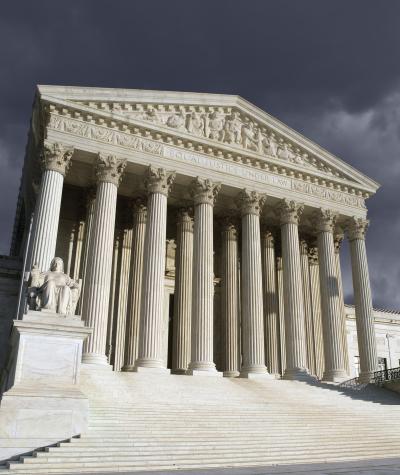This piece originally ran as an op-ed in Bloomberg Law on September 27, 2023.
Alabama legislators openly defied the federal government when it came to silencing Black voices by blatantly flaunting the U.S. Supreme Court’s recent decision in Allen v. Milligan, which required Alabama to draw fair congressional maps.
Yesterday, the Supreme Court stopped them in their tracks. Still, it’s distressing that Alabama sought a legal battle — with the hope of once again escalating the issue to the Supreme Court — over the fundamental freedom to participate in democracy. Clearly, the state had reason to believe the court might renege on its earlier pro-democracy ruling.
But the court remained steadfast, rejecting Alabama’s attempt yesterday with no dissents. Now, thanks to the court’s unexpected ruling in Allen v. Milligan back in June, which reaffirmed Section 2 of the Voting Rights Act, and yesterday’s affirmation, Black Alabamians will have a shot at a fair election in 2024.
In fact, American democracy dodged another bullet this year—a couple of weeks after the court’s June ruling in Allen v. Milligan, they handed down Moore v. Harper.
This was surprising. The court, led by Chief Justice John Roberts, has handed down a series of anti-democratic decisions over the past 15 years, including the Shelby County v. Holder decision that gutted Section 5 of the VRA — the all-important preclearance provision that did so much to protect the rights of Black and brown voters in the South.
With the chief justice and five conservative colleagues about to vote on Allen and Moore, there was good reason to worry.
Thankfully, the Supreme Court bucked its anti-democratic trend. In Allen v. Milligan, the court reaffirmed the validity of Section 2 of the VRA, which provides key protection for minority voters’ freedom to vote in fair Congressional districts.
But we’re not out of the woods yet. Unfortunately, despite the pro-democracy decisions this term, bad actors are still trying to use the court system to weaken democracy.
In Alabama, the legislature took the unprecedented step of blatantly defying the Supreme Court’s order in Allen v. Milligan by choosing different, but still discriminatory, maps. While the maps will now be drawn by a special master, the Alabama legislature tried and failed to bring the case back to the Supreme Court.
Clearly, the Supreme Court’s pro-democracy rulings are important victories, but of a particular kind: They avoided terrible results for voters, but didn’t improve American democracy.
It wasn’t always this way. During the second half of the 20th century, the court frequently played a pivotal role as a protector of democracy.
Since then, the Court has opened the door for laws that silence people of color, the poor, and the young, and permitted unbridled gerrymandering to entrench political factions unable to win majority approval.
At the same time, the Roberts Court has invalidated or critically weakened laws designed to protect voting rights and reduce the undue influence of money in politics. These decisions, taken together, form a stark and troubling pattern of distorting democracy.
Given the threats still looming, and the Roberts Court’s poor track record on democracy issues, it’s time to find new ways to defend and strengthen democracy so every voter can make their voice heard and know their vote counts.
State voting rights acts, a novel response to the limitations of and setbacks suffered by the federal VRA since it was passed in 1965, are a great first step. With growing momentum (six states have passed one in the past five years), state VRAs help ensure that Black and brown voters can make their voices heard on the issues that matter most to them and elect representatives who will fight for their communities.
But the freedom to vote should be accessible for every voter, not just ones who live in voter-friendly states. Federal legislation is necessary to expand and codify the freedom to vote — which is why Congress must pass the recently reintroduced Freedom to Vote Act and the John Lewis Voting Rights Advancement Act that strengthens the federal VRA.
And, of course, we must continue to fight tooth and nail at the Supreme Court to ensure all voters have an equal voice in our democracy.
This term’s democracy wins truly do deserve to be celebrated. Pro-democracy activists, including many of Campaign Legal Center’s partners in the movement, fought for years to make them a reality.
But we must recognize the shortcomings of the decisions and the tilted playing field we’re on — Alabama wouldn’t be trying to bring its discriminatory maps back to the court if it didn’t think it had a chance of overturning its previous pro-democracy decision.
Clearly, American democracy is still under attack, and we must continue to creatively and doggedly defend it.
Reproduced with permission. Published 9/27/2023. Copyright 2023 Bloomberg Industry Group 800-372-1033. For further use please visit https://www.bloombergindustry.com/copyright-and-usage-guidelines-copyright/

